ATTENDANCE
WHAT SHOULD I DO IF MY CHILD IS ILL OR HAS A MEDICAL APPOINTMENT?
If your child is absent or going to be late for any reason, please inform the school’s attendance team before 8.20am so form tutors know of the reason for absence before the registration period. It is important that a call is made on each day that your child is absent.
The attendance line telephone number and email address are 01727 731368 and email attendance@marlborough.herts.sch.uk, please store both in your phone contacts
When contacting the school please do ensure that you provide the full name of your child and the reason for their absence.
By law, only the head teacher can authorise your child’s absence. Reasons for this might include holidays, sporting activities or other exceptional circumstances. It is important to keep the school informed if your child is going to be absent as soon as possible at the start of the day.
If your child is frequently absent due to illness the school may request permission to contact your GP for confirmation that they are too ill to attend school, medical evidence maybe requested for each absence, and we are grateful for your support with this.
If it becomes clear that your child will be away from school for longer than expected, phone the school to explain this as soon as possible so we can determine a way forward.
If your child attends school and feels unwell during the school day they will be directed to student services and the school will contact you to arrange collection from the school reception.
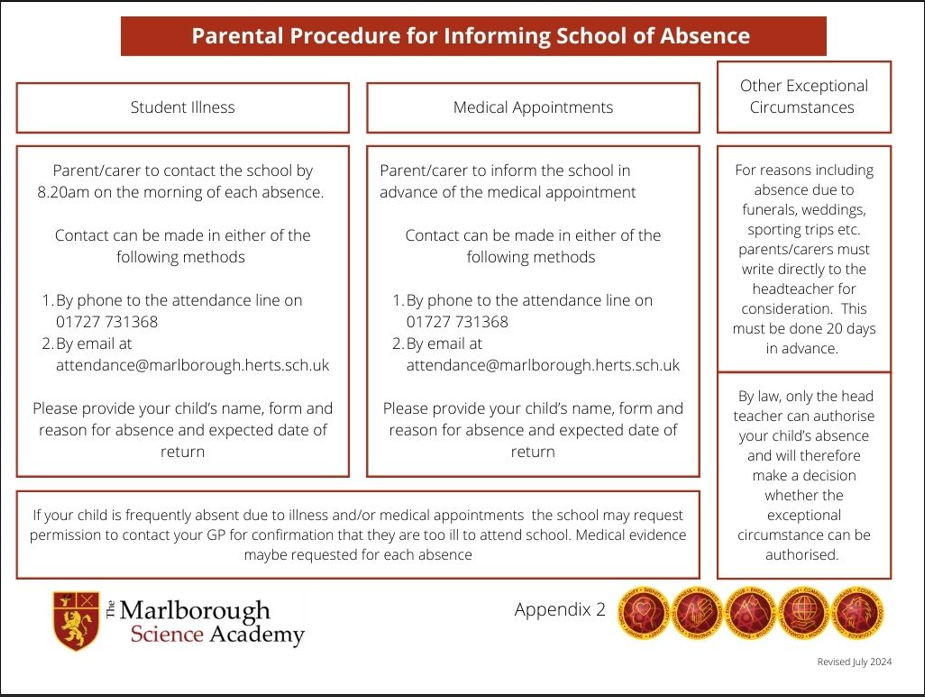
Call PROCEDURE
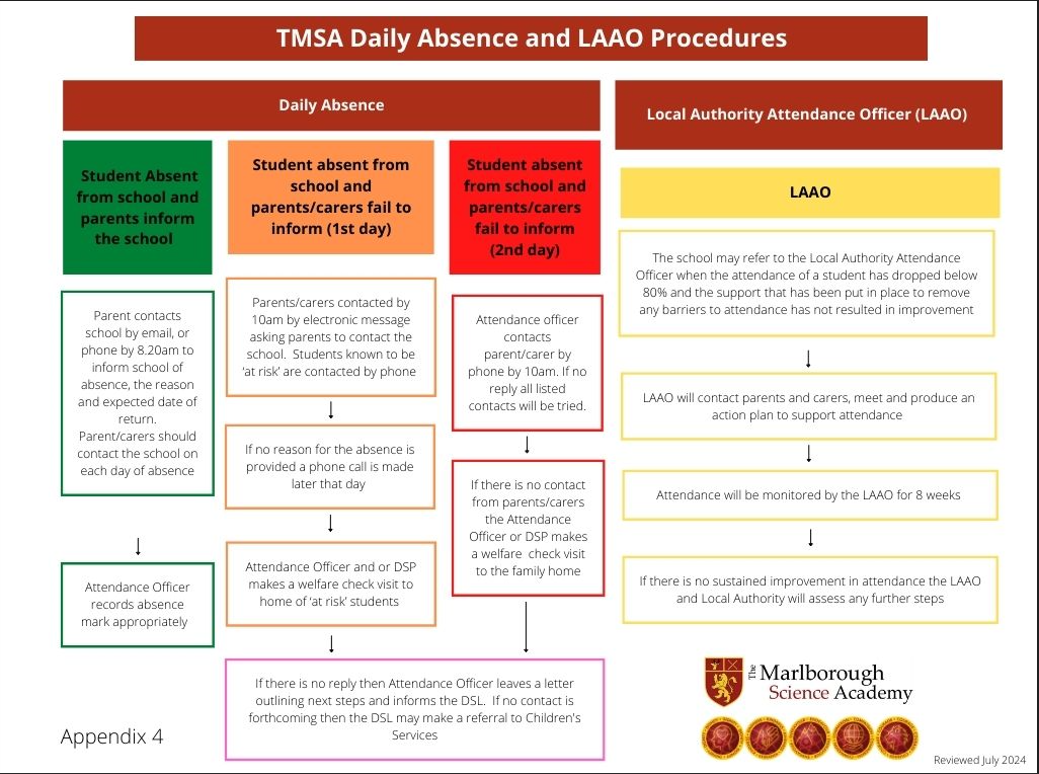
How will absences from school affect students progress?
Attainment levels
The quality of schoolwork and qualifications gained will be significantly lower if attendance is lower.
School Routine
Your child's learning and that of other students could be disrupted by the missing of vital classwork.
A child or young person's well-being and long-term life opportunities may be adversely affected by the missing of positive experiences associated with school and learning.
What is acceptable attendance?
We expect all students to aim for 100% attendance.
96% attendance is regarded as good and can be achieved with minimal illness.
Any attendance level that creates a cause for concern would initiate intervention by the school, this could be as simple as a ‘chat’ with the form teacher or may, in more severe circumstances, lead to the involvement of our attendance team, our family support worker or referral to agencies outside of the school.
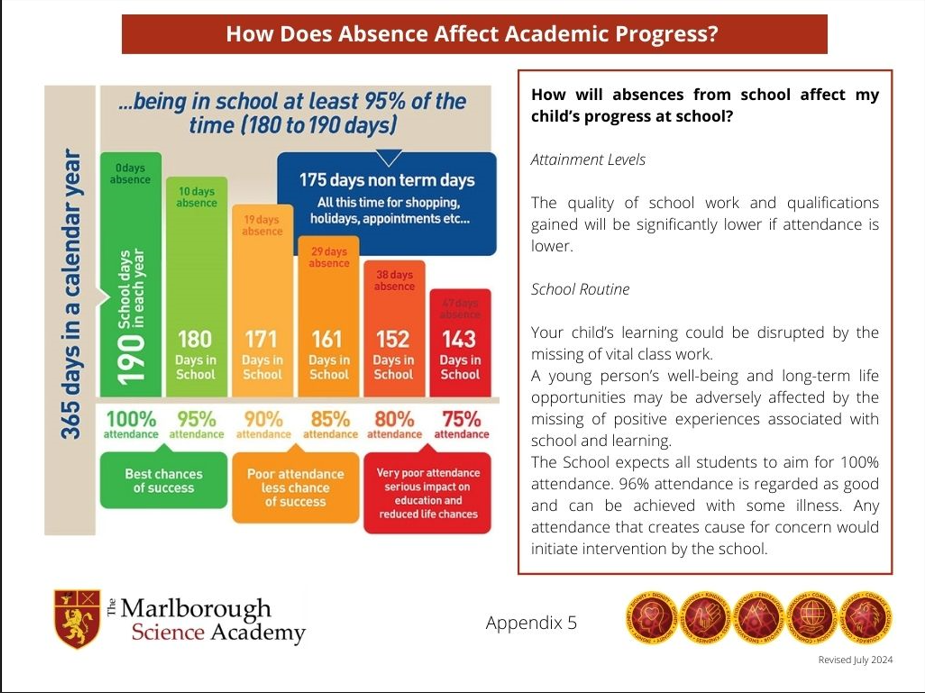
How does the school record absence?
The school uses an electronic system of attendance registration that is updated within each lesson by the form teacher or subject teacher.
Absence is categorised as being authorised (agreed and accepted by the school as being appropriate) or unauthorised.
Examples of authorised absence would be genuine illness, medical appointments etc.
Examples of unauthorised absence would be truancy, parentally condoned absence without appropriate reason, taking a day off for a birthday and unauthorised holidays in term time. Meet with the relevant pastoral leader to discuss barriers to attendance and any appropriate support required. An action plan will be produced and the attendance monitored.
IF ABSENCES ARE A CAUSE FOR CONCERN, WHAT happens?
If your child’s absences are more frequent, you should expect to receive a letter informing you of your child’s attendance level.
You may be asked to attend a meeting in school to identify any potential barriers and any appropriate support that is required to improve the attendance, where appropriate this may include the use of external agencies.
A plan of action will be compiled that is aimed at helping you improve your child’s school attendance.
A failure to comply with any such plan without a valid reason will, if your child’s school attendance does not improve, may result in a penalty notice being issued or in a referral being made to the local authority who will aim to support you in ensuring your child attends school regularly.
Further poor school attendance by your child may result in legal action being taken against you by the local authority.
Can a student take a holiday in term time?
Due to the legal change in the Department for Education (DfE) legislation, at The Marlborough Science Academy we will only grant leave of absence in exceptional circumstances that are not related to holidays.
Parents/carers must complete a Leave of Absence Request Form (see below) and return to the headteacher at least 20 days before requesting permission to take their child out of school during term time due to an exceptional circumstance.
Term time holidays/extended leave are not allowed unless the circumstances are exceptional (rare), and parents/carers are discouraged from arranging them in term time.
If parents/carers choose to take their child out on holiday in term time the absence will be recorded as an unauthorised absence, this can lead to a Fixed Penalty Notice being issued.
You will be contacted by the school, either by telephone, letter and/or visit to your home in order that the level of, and reasons for, your child’s absence can be discussed with you if we have any concerns.
application for leave of absence from school
please print the form below to complete
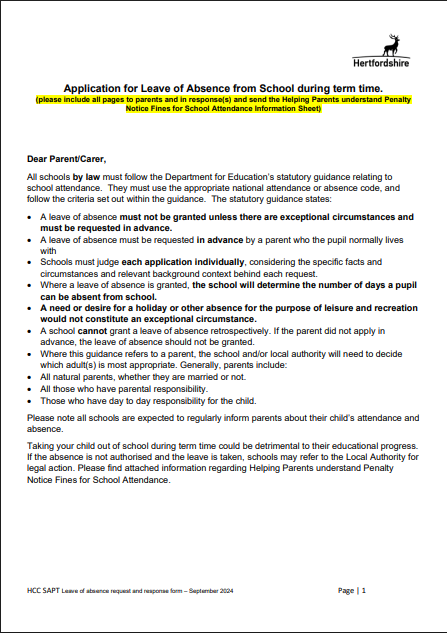
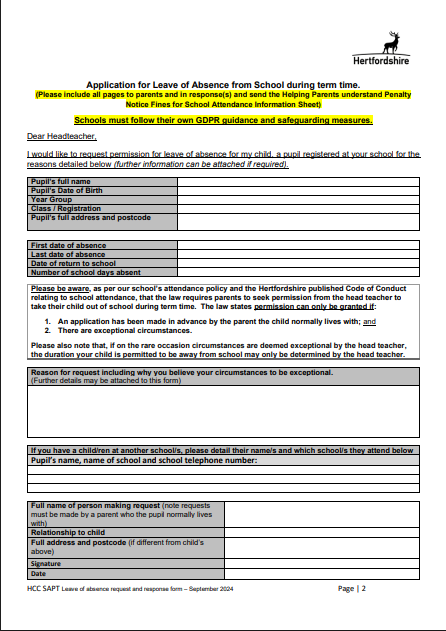
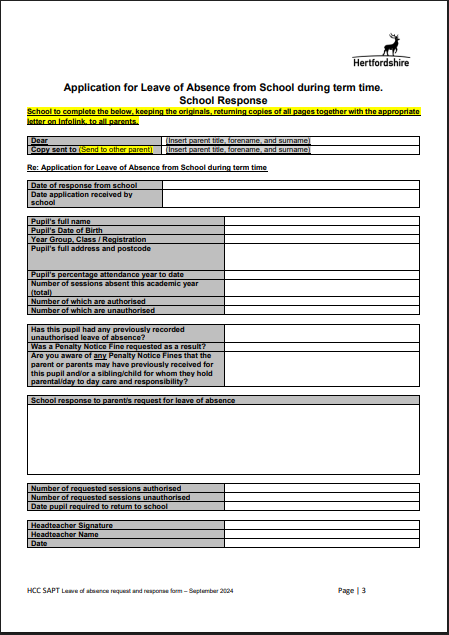
WHAT HAPPENS IF students are LATE TO SCHOOL?
The attendance team can be contacted on: 01727 731368. Please leave a message on the 24 hour absence line. Or email attendance@marlborough.herts.sch.uk,
Please store both in your phone contacts
Morning registration begins at 8.40am every morning so students should aim to arrive on the school site by 8.35am.
Learning begins during registration. This is where form tutors meet and greet the students and can ensure that they are ready for the day. Our twenty-minute form period is designed to help teach our character education programme, highlight important events in school and around the world and enables students to develop literacy and oracy skills.
Lateness to school quickly adds up to lost learning time – over the course of the year 15 minutes of lateness each day adds up to two school weeks of lost learning time.
Lateness will be monitored alongside attendance and if punctuality is a concern parents will be contacted. If no improvement is forthcoming, then parents will be asked to come into to school to discuss what action will be taken.

If my child has an unacceptable level of unauthorised absence, what can I expect to happen?
You will be contacted by the school, either by telephone, letter and/or visit to your home in order that the level of, and reasons for, your child’s absence can be discussed with you.
A plan of action will be compiled that is aimed at helping you improve your child’s school attendance.
A failure to comply with any such plan without a valid reason will, if your child’s school attendance does not improve, may result in a penalty notice being issued or in a referral being made to the local authority who will aim to support you in ensuring your child attends school regularly.
Further poor school attendance by your child may result in legal action being taken against you by the local authority.
You may initially be issued with a Fixed Penalty Notice warning letter. We may also request medical evidence for each absence due to illness.
See the information provided below in regard to the Fixed Penalty Notice.
WHAT IS A FIXED PENALTY NOTICE?
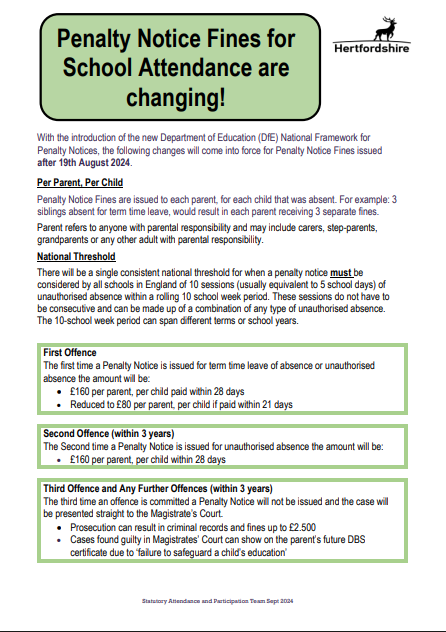
The use of Penalty Notices has been updated due to changes in the law from 19th August 2024.
Any attendance penalty notices issued after the 19th August 2024 will be issued in line with the new regulations.
There will be a single consistent national threshold for when a penalty notice must be considered by all schools in England of 10 sessions (usually equivalent to 5 school days) of unauthorised absence within a rolling 10 school week period. These sessions do not have to be consecutive and can be made up of a combination of any type of unauthorised absence.
The 10-school week period can span different terms or school years.
If a Penalty Notice is required.
- Each parent will be issued a separate penalty notice, for each child who is absent.
- For example, 2 parents and 3 children, each parent will receive 3 penalty notices for £160 each, with a family total of £960 in fines.
- The fine amount will be £160 per parent, per child paid within 28 days, reduced to £80 per parent, per child if paid within 21 days.
- This will be considered your first offence.
- The next time an offence occurs, within 3 years of the date the first penalty notice is issued, the fine amount will be £160 per parent, per child paid within 28 days, with no reduction.
- The third time an offence occurs this will be presented to Magistrate’s court with no penalty notice issued.
This will include unexplained absence and irregular attendance. Unexplained absence does not just include absence due to holidays. Where a child is absent and it is believed they are absent due to term time leave, the school will carry out a home visit to see the child on or before the 3rd school day of absence.
Unauthorised absence due to holidays of more than 10 sessions (5 days) in a rolling period of 10 school weeks will result in a penalty notice being issued.
For irregular attendance where a child has unauthorised absences of 10 sessions or more in any 10-week period, the school must consider escalation to prosecution. Sessions refer to each half a school day, with the school having 2 sessions each day (an am and pm session). The school must consider the reasons for the absence, the support already offered, and the engagement of the parents/carers and young person. These 10 sessions could be made up of term time leave, unauthorised late marks, or unauthorised absence.
It is therefore important that parents/carers notify the school every day that their child is absent, providing a reason, and where appropriate evidence of medical appointments or prescribed medication. The school will consider NHS guidance Health protection in children and young people settings, including education - GOV.UK (www.gov.uk) and https://www.nhs.uk/live-well/is-my-child-too-ill-for-school/when making their decision whether to authorise absence due to illness.
Penalty notices will only be issued following the Hertfordshire Code of Conduct, a copy of which can be found on the school website.
What kind of unauthorised absences result in the issuing of a fixed penalty notice?
- Where students are openly truanting, this includes students found during truancy sweeps by the police.
- Absences from school which parents or carers are aware of, but that are not authorised by the school.
- Holidays that have been taken in term time which the headteacher has not authorised.
- An unacceptably delayed return from an extended holiday if the parents or carers have not received permission beforehand from the school.
- Regular late arrival at school (after the register has closed)
How can I help my child?
- Let your child know that you think school is important.
- Make sure your child goes to school regularly and on time.
- Take an interest in your child's schoolwork.
- Provide regular times and a quiet, clean area for doing home learning.
- Set a regular bedtime schedule. Age should not be a factor.
- Provide your child with plenty of time to get ready for school.
- If your child starts to miss school, speak to the school, and let your child know he/she must attend.
- Have regular communication with the school.
- If your child is ill, contact the school and explain the reason for the absence.
- Don't expect your older children to stay home and act as babysitters for younger children.
- Set good examples and enforce rules.
- Include regular exercise and a balanced diet in your child's daily activities.
- Post the school calendar and notes on the refrigerator, or another prominent location.
- Balance time with extracurricular activities.
- Keep open communication lines with your child.
Attendance Case Study for the Local Authority
A Parent's Guide to Managing Sickness Absence from School
Illness
Occasionally, students are too unwell to attend school. We will monitor and engage with parents as soon as a pattern of absence becomes apparent.
When deciding whether or not your child is too ill to attend school. Ask yourself:
- Is your child well enough to carry out the activities of the school day? If not, keep your child at home and consult your GP as appropriate
- Does your child have a contagious condition that could be passed on to other children or staff? If so, keep your child at home
- Would you take a day off work if you had this condition? If so, keep your child at home
If you are uncertain if your child is well enough to attend school, please consult the NHS guidelines at
https://www.nhs.uk/live-well/is-my-child-too-ill-for-school
Common conditions
Most illnesses can be classified as one of a few minor health conditions.
Whether or not you send your child to school will depend on how severe you judge the illness to be. This guidance can help you to make that judgement. If you’re concerned about your child’s health, consult a health professional.
Cough and cold
A child with a minor cough or cold may attend school. If the cold is accompanied by raised temperature, shivers or drowsiness, the child should stay off school, visit the GP and return to school 24 hours after they’re feeling better.
If your child has a more severe and long-lasting cough, consult your GP, who can provide guidance on whether the child should stay off school.
Raised temperature
If your child has a raised temperature, they shouldn’t attend school. They can return 24 hours after they’re feeling better.
Rash
Rashes can be the first sign of many infectious illnesses such as chickenpox and measles. Children with these conditions shouldn’t attend school.
If your child has a rash, check with your GP or practice nurse before sending them to school.
Headache
A child with a minor headache doesn’t usually need to be kept off school. If the headache is more severe or is accompanied by other symptoms such as raised temperature or drowsiness, then keep the child off school and consult your GP.
Vomiting and diarrhoea
Children with these conditions should be kept off school. They can return 48 hours after their symptoms disappear. Most cases of vomiting or diarrhoea get better without treatment, but if symptoms persist, consult your GP.
Sore throat
A sore throat alone doesn’t have to keep a child from school. If it’s accompanied by a raised temperature, seek medical advice
DETENTION PROCEDURE
Middle Manager Detentions – Lunchtime – Da Vinci Hall – 13.25-13.45
Monday to Friday Maximum Number in Session 30
Who can issue a detention?
All members of staff. Staff should discuss with their line manager the reason for issuing the detention.
When is the detention issued?
Where possible these should be issued for the next day. Detentions for the next day should be issued before 4.30pm the day before. This is to allow the automated message to be sent to students and parents via Edulink.
How is the detention communicated to parents and students?
- If there is a behaviour incident that warrants the issuing of a detention the member of staff issuing the detention should make contact home to explain and to ensure the parent is aware of the date of the detention.
- Edulink will send an automated message during the evening that the detention is placed on the system.
- Staff teaching the student the morning before the detention will be able to see a note on the register indicating the student has a detention enabling them to remind the student.
Staff Responsibility
Staff that have issued the detention should attend the detention to undertake a structured conversation with the student
Staff teaching the students in the lesson directly before the detention should where possible escort the students to the detention hall.
Non-Attendance
- Students that fail to attend due to absence will have their detention moved to the next available detention spot.
- Students that fail to attend the detention due to non-attendance will be issued with a behaviour incident, missed middle leaders detention, and a SLT after school detention.
SLT Detentions – After School – Da Vinci Hall – 15.10-16.00
Monday, Tuesday, Thursday and Friday Maximum Number in Session 10
Who can issue a detention?
Middle Managers and Senior Staff.
When is the detention issued?
Where possible these should be issued for the next day. Detentions for the next day should be issued before 5pm the day before. This is to allow the automated message to be sent to students and parents via Edulink.
How is the detention communicated to parents and students?
- If there is a behaviour incident that warrants the issuing of a detention the member of staff issuing the detention should make contact home to explain and to ensure the parent is aware of the date of the detention.
- Edulink will send an automated message during the evening that the detention is placed on the system.
- Staff teaching the student the morning before the detention will be able to see a note on the register indicating the student has a detention enabling them to remind the student.
Staff Responsibility
Staff that have issued the detention should attend the detention to undertake a structured conversation with the student
Staff teaching the students in the lesson directly before the detention should where possible escort the students to the detention hall.
Non-Attendance
- Students that fail to attend due to absence will have their detention moved to the next available detention spot.
- Students that fail to attend the detention due to non-attendance will be issued with a behaviour incident, missed SLT detention, and will be issued with a Tuesday detention.
- Further missed detentions will result in behaviour inventions involving parents/carers.
Form Tutor Detentions (By Year Group) – After School – Flexible Location – 15.10-15.30
Tuesday and Wednesday Maximum Number in Session 10
Who can issue a detention?
Form tutors – to be run by the member of staff issuing the detention.
What is this detention for?
This detention is available for use by form tutors for reasons such as continued issues with uniform, lateness to school or non-attendance to form and failure on a white report.
When is the detention issued?
Where possible these should be issued for the next day. Detentions for the next day should be issued before 4.30pm the day before. This is to allow the automated message to be sent to students and parents via Edulink.
How is the detention communicated to parents and students?
- If there is a behaviour incident that warrants the issuing of a detention the member of staff issuing the detention should make contact home to explain and to ensure the parent is aware of the date of the detention.
- Edulink will send an automated message during the evening that the detention is placed on the system.
- Staff teaching the student the morning before the detention will be able to see a note on the register indicating the student has a detention enabling them to remind the student.
Staff Responsibility
Staff that have issued the detention should attend the detention to undertake a structured conversation with the student
Non-Attendance
- Students that fail to attend due to absence will have their detention moved to the next available detention spot.
- Students that fail to attend the detention due to non-attendance will be issued with a behaviour incident, missed detention, and can be added to the middle leaders detention.
